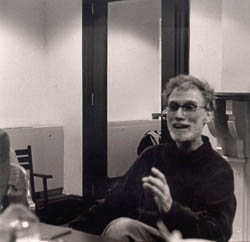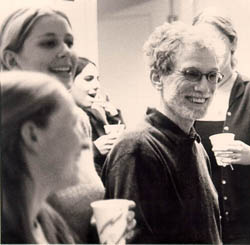An Interview with Writer Max Apple
The Daily Pennsylvanian
Spring 2002
Max Apple is the author of six books, including I Love Gootie: My Grandmother's Story (1998) and Roommates: My Grandfather's Story (1994). He has written the screenplay for the 1995 film Roommates, and won fellowships from the Guggenheim Foundation and the National Endowment for the Humanities. He taught creative writing at Rice University for 29 years, yet only a year after retiring, he started working again - here at the University of Pennsylvania. He's been teaching his fiction and nonfiction creative writing courses on campus at the Kelly Writers House since fall 2001. In spring 2002, Liz Rahaim sat down with Max to talk about his career, his writing, and his new place at the Kelly Writers House.
Liz Rahaim: First I want to ask you something about your background. You worked at Rice University for 29 years, and then retired. What made you move to Philadelphia and start teaching again at Penn?
Max Apple: My wife - my wife got a job here at Penn, and we moved to the area. I actually retired quite early, but I still like to teach, so Penn offered me a job and I took it. I'm teaching one class per semester.
LR: Do you anticipate teaching here for several more years?
MA: As long as I'm having fun and the students don't complain, I'll continue.
LR: How did you come to learn about the Kelly Writers House?
MA: When I came to Penn for an interview, they sent me to the Writers House. I only visited briefly, but I loved the place right away. It's just such a wonderful idea to have an informal meeting place for people interested in writing to gather.
LR: Were you thinking of teaching at the Writers House right away?
MA: I was hoping to; I liked the informal atmosphere. I liked the idea of being able to go to the kitchen on break from class and make coffee. I knew I liked being in the building. The whole idea of writing as a student is always double-edged - you're subjected to a lot of criticism. On the other hand, if you're criticized all the time, how can you be loose enough to write? So it seems to me that an informal atmosphere, like that at the Writers House, creates a community within a critical establishment. It sets the right tone.
LR: How did your interest in writing come about?

-
An Interview with Writer Max Apple
Photo by Gina Simoncini/The Daily Pennsylvanian
MA: My grandmother was a great storyteller, so I grew up hearing the real thing. I knew that a good story was the best thing in the world. I grew up in a poor neighborhood in the Midwest, and the idea of being a writer, or of being anything other than a factory worker, didn't occur to most people, nor did it occur to me. I didn't know what a writer was. Then I just fell in love with stories and novels when I was in college. I still didn't know what it was to be a writer, and I still don't. I just daydream and I write it down. In a few years if I'm lucky a book comes out, a few other people read it, and then I go back to my room and write another one.
LR: Where did you go to college?
MA: I'm from Michigan, and I went to the University of Michigan.
LR: Did you go to school after you graduated college?
MA: After I graduated I entered a writing program at Stanford. My father died when I was there, so I dropped out of school and came home to Michigan. I worked for a while, and then I went back to graduate school at the University of Michigan, and I took my grandpa with me. That's how Roommates started. I was there during all the anti-war years living with a 95-year-old man. And then after I got a Ph.D. I had a one-year job at Reed College in Oregon, and I got married and moved there, and then I took the job at Rice.
LR: Your works about your grandparents, Roommates and I Love Gootie, are more memoir-esque, and they've had a lot of commercial success. Where do you go from there - are you planning on writing a more autobiographical work?
MA: Well, I've pretty much exhausted my grandparents. I am now in the midst of a novel.
LR: You are? Do you want to talk about it at all?
MA: I can't.
LR: You can't - does talking about it ruin it for you?
MA: Well, I'm still busy dreaming it, so I can't talk about it. Once you say it, it makes it seem like this is really it, when everything can change all the time. A lot of the material is always plastic in a writer's imagination. You meet this wonderful stuff while it's still alive.
LR: When did you start to write?
MA: Well, I had a fellowship to go to Oxford in England for a while, and it was there that I decided I was going to be a writer. I also loved teaching. I knew that as a graduate student when I started teaching freshman English, and they let me teach great books - the classics, starting with Homer. I really liked that because I hadn't read a lot of those work before. I'd just be a day ahead of the class. I loved working with the students. I didn't know I'd like being a teacher so much. But that cemented it, so I continue now because I want to. I don't have to teach anymore - I just like to.

-
An Interview with Writer Max Apple
Photo by Gina Simoncini/The Daily Pennsylvanian
LR: How do you go about teaching fiction and nonfiction writing - do you come up with exercises for your students to do?
MA: I occasionally give them exercises. I'll make them write without using adverbs and adjectives, and they get very angry with me. But the real thing is to get them relaxed. It's much easier to teach nonfiction because fiction writing - when it works - for certain students is like breathing; it's a life. They are able to create imaginative worlds and enter them. Others struggle, although it's something that can be learned, by learning to relax and daydream.
LR: I had a professor who taught fiction writing, and she told me that you shouldn't take a course in fiction writing from a person whose work you don't like. Do you encourage your students to read your work at all? What's your take on that?
MA: No, I never have encouraged students to read my work; I never have. You see, I feel the opposite. I think that it's so easy for a student who's a young person to be influenced, to become an acolyte. That's the last thing I want. My influence is heavy in the class just because I'm the teacher - just because I'm a strong opinion, and I have the power to grade. But what I think your teacher is getting at - I think you can't learn from someone who's not your friend.
LR: What's important about being a friend and a teacher?
MA: When I teach, I think it's important to be a friend, an ally to the students. So the best way that I can be their friend is to help them clean up their style, get rid of what they don't need, and show them, in as kindly a way as possible, a straight path through all this confusion that is in our lives and in our narratives. And once they get it, they often get it very well. Getting it is a hard thing, and getting it in an academic context in a semester, when students are being judged all the time is really difficult. I judge harshly often, and I don't mince my criticism. I don't think I'm helping anyone by saying "oh, this is wonderful." At its best being a writer or trying to be a writer is a difficult thing, and at its best it requires an honest reader. I want to be that honest reader.
LR: It sounds like the atmosphere you build when teaching is one based on trust and getting to know students. Does teaching in a nontraditional setting like the Writers House help create the kind of relaxed atmosphere you talked about earlier?
MA: I think that being able to come down and have coffee, like I said before, helps people relax even while they're being judged. You can't write imaginatively in any way unless you can relax and put your guard down. So you do it in an atmosphere where if you're being judged it feels like you're at home, like you're in a living room or a bedroom. I consider the workshop so intimate that I never allow an observer, a friend, or anyone to come in. If you're writing an essay, or you're writing a story, the only other people who should be able to see it are the people who are also showing themselves - not strangers. If you publish - fine, then you're inviting the world to look. Fiction writing is a lot of daydreaming, free association. I like to do this where we can sit in a different room from where the students sit to do math or science or history or philosophy. The Writers House is a wonderful idea, and it seems to be working beautifully in practice too. I hope I'll be able to teach here all the time that I'm at Penn.
LR: What has the House come to mean to you since you've started teaching here?
MA: I love it here. I'm pleased just walking in. I don't spend a lot of time on campus; I'm mostly home. I don't know the names of any of the other buildings and being new, I don't know many people at Penn. I spent most of my teaching career at a small place where there were 3,000 students and everybody knew me. When I walk into the Writers House, it just feels like home - right away. The staff is terrific. I love making coffee for my class. I don't know if they know how much I like being here. It's the one place on campus where I can feel at home. It's my house too.
Liz Rahaim (C'02) graduated as an English major with a creative prose concentration and was Development Intern and Planning Committee member at the Kelly Writers House.
